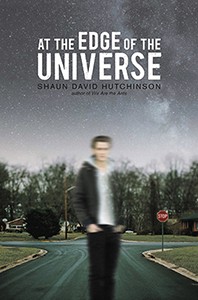2018 School Spending Survey Report
Spring 2017 Publishers’ Preview: Five Questions for Shaun David Hutchinson
This interview originally appeared in the March/April 2017 Horn Book Magazine as part of the Spring Publishers’ Preview, an advertising supplement that allows participating publishers a chance to each highlight a book from its current list.

This interview originally appeared in the March/April 2017 Horn Book Magazine as part of the Spring Publishers’ Preview, an advertising supplement that allows participating publishers a chance to each highlight a book from its current list. They choose the books; we ask the questions.
Sponsored by![]()
 Photo: Chris Piedra.
Photo: Chris Piedra.In At the Edge of the Universe, Ozzie is the only person who remembers his boyfriend Tommy, who suddenly disappeared from everyone else’s versions of reality — and, along with him, much of the universe.
1. So, is our universe just a simulation?
There are some interesting theories, but no definitive proof either way. If it is, though, I hope I don’t die of dysentery.
2. How reliable a narrator is Ozzie?
He believes everything he’s saying. Whether or not that makes him particularly reliable is open to interpretation.
 3. Several of your novels have sci-fi elements. What about sci-fi speaks to you?
3. Several of your novels have sci-fi elements. What about sci-fi speaks to you?Science fiction gives me the space to explore human emotions in a richer way than I could do in straightforward contemporary fiction. Science fiction is frequently about looking toward the future, and though the future often seems bleak, I think it’s also filled with hope and wonder — a necessary counterbalance to the realities of life.
4. There are a lot of heavy topics here, but overall Ozzie’s perspective is darkly humorous. How did you strike the right balance?
I try to take the things Ozzie and his friends are going through seriously — to treat them respectfully — while at the same time not taking life itself seriously. I suffer from depression, and I would never laugh at my own depression or at what someone else is going through, but I can laugh at the absurdity of it as a whole. It’s absurd that there’s this switch in my brain that turns my entire world dark for no discernible reason. So for me the balance is about laughing at life without ever laughing at individual lives.
5. What would you like to see more of in queer YA?
Right now I think queer YA is going through its origin-story phase. Readers are being introduced to types of characters and lives that they maybe haven’t seen before. As such, we’re getting a lot of stereotypical character narratives. But I’m ready for us to start pushing beyond the stereotypes. I want to see queer characters in all the roles heterosexual characters have been written into over the years, and for those books not to be treated as something unusual.
Sponsored by![]()
RELATED
RECOMMENDED
ALREADY A SUBSCRIBER? LOG IN
We are currently offering this content for free. Sign up now to activate your personal profile, where you can save articles for future viewing.







Add Comment :-
Be the first reader to comment.
Comment Policy:
Comment should not be empty !!!